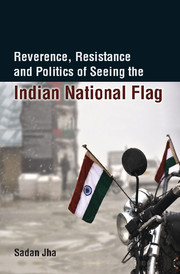Book contents
- Frontmatter
- Contents
- List of Figures
- Preface
- Acknowledgements
- Introduction
- 1 Rise of the Flag
- 2 Flag on the Hut: Totem and a Political Symbol
- 3 The Indian National Flag as a Site of Daily Plebiscite
- 4 Shades of History: A Case of Saffron Colour
- 5 Visualizing an Ideal Political Order
- 6 A Post-Colonial Symbol
- 7 Gendered Symbol, Communal Politics
- Epilogue The Flag as a Sacred Political Symbol
- Bibliography
- Index
3 - The Indian National Flag as a Site of Daily Plebiscite
Published online by Cambridge University Press: 18 December 2015
- Frontmatter
- Contents
- List of Figures
- Preface
- Acknowledgements
- Introduction
- 1 Rise of the Flag
- 2 Flag on the Hut: Totem and a Political Symbol
- 3 The Indian National Flag as a Site of Daily Plebiscite
- 4 Shades of History: A Case of Saffron Colour
- 5 Visualizing an Ideal Political Order
- 6 A Post-Colonial Symbol
- 7 Gendered Symbol, Communal Politics
- Epilogue The Flag as a Sacred Political Symbol
- Bibliography
- Index
Summary
The Nation of ‘a Mere Nobody’
‘In the fight at Nagpur there is certainly a national principle at stake.’—‘a mere nobody’ wrote to the editor of the Hitavada, the leading English weekly from Nagpur (Central Provinces) in 1923. He further wrote, ‘The point at issue at Nagpur is not whether a particular piece of cloth can be called the national flag but whether India as a nation has a right to have her own distinct national flag even though she may remain a partner in the empire of Great Britain.’
The anonymity of the author of this letter to the editor, at first, instance appears as the mark of its subalternity. The citizen subject is invisible. However, in this instance, anonymity has been desired and not imposed (at least not directly) upon the author of this letter. Anonymous author enormously expands the field of play for the text of the national flag. There may be various ways of reading this reader's response. One way of entering the debate could be to question and analyse the use of various words, i.e. ‘nation’, ‘national stake’, ‘national flag’, etc. But this is not my concern here. What is to be more prudent is the context of this ‘text’, the anonymity of its author and obviously the structure, the narratives of the text. By choosing not to associate the name of the author with any particular individual, the letter in fact offers a possibility to include the entire nation as scripting this correspondence. The author is nameless and faceless hence any one of the readers can be its author. This totalizing possibility also erases the definitional boundaries of the ‘other’ of this text. Just as anyone can become the author of this textual field, anyone one can also be ‘other’ of this field. The other acquires mythic position. It is not merely a question of making claims over the representational space. In this claim, the contestation is inherent and manifested at multiple levels. The fight over the earlier mentioned cultural symbolic constitution is articulated in the language of rights—‘whether India has a right to have its own distinct flag’. It goes beyond the question of making claims over the representational space. The letter is directly addressing and including the space of the imagination of the nation.
- Type
- Chapter
- Information
- Publisher: Cambridge University PressPrint publication year: 2016



